Let’s look at Olympic weight plates – cast iron plates and bumper plates.
The most important item in your garage gym is an Olympic barbell that will meet the needs of your preferred training style.
But a barbell with no Olympic weight plates isn’t a challenge for very long.
In this article, we’ll review the Olympic weight plates you need:
The Olympic barbell uses weight plates with a 2.0-inch diameter hole in the center. Beyond that you can choose metal plates (iron or steel, and typically used for bodybuilding and powerlifting) or bumper plates (used for the Olympic lifts that are popular in CrossFit training – the snatch, and clean and jerk).
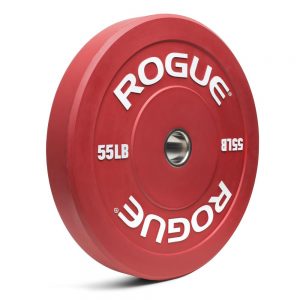 What are bumper plates? They are plates made primarily out of very dense rubber (or urethane – more on that later).
What are bumper plates? They are plates made primarily out of very dense rubber (or urethane – more on that later).
Why?
Bumper plates are meant to be safely dropped from overhead.
They are wider than steel (or iron) plates, because rubber is not as dense as iron. They are typically more expensive as well, it’s hard to make a product that can survive drops from overhead for years. Please note that steel plates with a thin rubber coating are not bumper plates – they cannot be dropped – or damage ensues.
Why would you want to drop a loaded barbell from overhead? It’s often necessary for the Olympic lifts – if you have to bail on a failed clean, jerk, or snatch. It’s also the energy efficient way to end the lift. Let it drop to the floor. It’s not impossible to lower a heavy barbell from overhead, but if you have bumper plates – why bother?
But even beyond the question of steel vs bumper plates – there’s still a few key decision points you should know about.
Olympic Weight Plates – How Do You Want to Train?
What sort of training do you intend to do? If you are training the power lifts – the squat, deadlift, bench press, and overhead press – these are lifts done for pure strength training, they are done slowly, and do not involve dropping the barbell – then steel or iron plates are a fine choice.
Bumper Plates vs Steel Plates
Iron or steel plates are cheap, durable, and readily available. Nearly any sporting goods store will have iron plates. Buying them locally helps save on shipping costs. Check craigslist and local garage sales as well for used weight plates. That’s going to be the most bang for your buck – it’s hard to wreck iron plates. They may look old, rusty, or grimy, but when it comes to iron or steel – weight is weight. The only recommendation we’d add on used weight plates – weigh them – you might be surprised how far they are off from spec – especially for the cheapest cast iron plates.
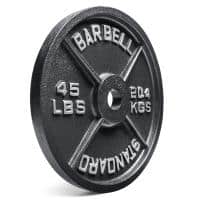 But if you want a sharp looking product, and buying local isn’t an option – here’s a good choice – the Rogue Olympic Plates. These cover all the essentials – sold in pairs, made from old school cast iron, a heavy duty black finish with silver lettering. Available in sizes from 1.25 lbs. all the way up to monster size 100 lbs. plates.
To properly equip a garage gym, we’d recommend:
But if you want a sharp looking product, and buying local isn’t an option – here’s a good choice – the Rogue Olympic Plates. These cover all the essentials – sold in pairs, made from old school cast iron, a heavy duty black finish with silver lettering. Available in sizes from 1.25 lbs. all the way up to monster size 100 lbs. plates.
To properly equip a garage gym, we’d recommend:
- Two 1.25 lb plates (useful for micro-loading – or making very small increments of progress),
- two 2.5lb plates
- two 5lb plates,
- two 10lb plates,
- two 25lb plates,
- and as many pairs of 45 lbs. plates you think you’ll need as a start. You can always add more later.
Rogue also offers machined cast iron plates and even calibrated steel plates.
Why these? They look sharp – but more importantly they are more precisely manufactured – and these options are all about precision. The calibrated plates are within 10 grams of the specified weight. Obviously, these are a bit more expensive. If you must have precision, or you want something that looks really good – they are a great option. But otherwise, they are overkill for the average home or garage gym.
Let’s move on to the bumper plate options.
If you are training the Olympic lifts – or doing a little bit of powerlifting and Olympic lifting – you’ll want bumper plates. It will be challenging to find a source of high quality bumper plates locally, in most cases. We’ll highlight some better options here.
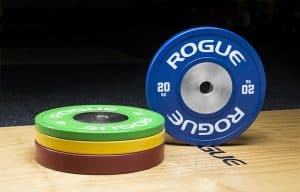
We’d go to the Rogue Color Kg Training 2.0 Plates as our primary choice. Why?
- Sold in a set (a pair each of 10KG, 15KG, and 20KG Plates), or buy what you need in pairs.
- They are training plates, not calibrated for competition – so they are cost-effective.
- Sold in a complete set, and have the proper IWF mandated color coding and looking sharp. If you’re going to build a man cave gym – let’s make it look good, ok?
- In Kilograms denomination – the world of Olympic lifts is ruled by the Kilogram.
- See that large steel disc insert in the center? That helps make the necessary weight, in a minimum width plate. With less steel insert, you’d need more dense rubber, which is going to mean wider plates.
- High quality- Make no mistake, these are not the garbage bumper plates in your local big box sporting goods store. These are serious training tools that will last a long, long time.
As an example, the bumper plates above have a durometer rating of 90 – which is excellent – they will give a consistent dead blow with minimal bounce.
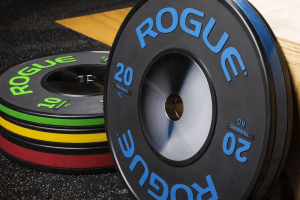
And, if those specs sound great but the plates are too colorful for you – check these out.
The Rogue Black Training KG Bumper Plates are manufactured to the same high standard as the color training plates, but these bumpers have an all-black, gloss-matte-gloss finish.
They also have a unique, color-coded rubber stripe that wraps around the full perimeter of each plate.
This of course allows for quick visual weight identification from any direction or distance.
And these plates have an impressive durometer rating of 94. This will ensure a dead blow drop on par with some of the top high-end Olympic bumper plates availabl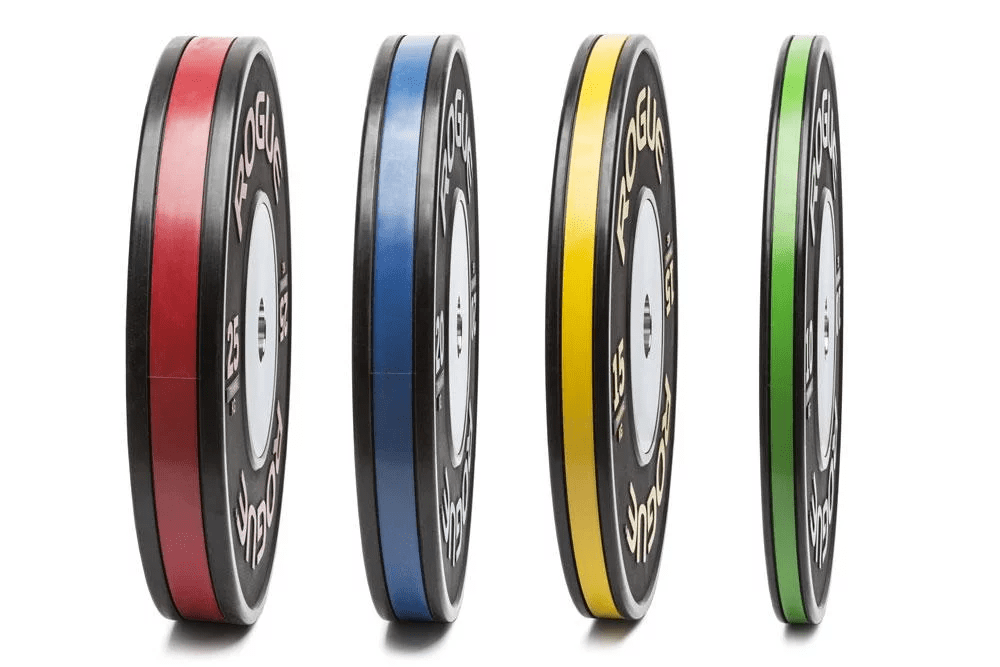 e.
e.
Bumper Plates – a more cost-effective option
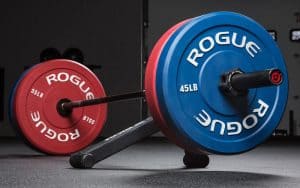
If that option is a budget breaker, this would be our next choice: Rogue Color Echo Bumper Plate. These will get the job done, and save a bit of money at the same time. They are sold in a set, or purchase plates individually.
They’ve got a durometer rating of 88 and are sold in pound sizings.
These are your best value bumper plates.
Bumper Plates – High Fashion Options
Rogue’s new Fleck Plates bring more style to your garage gym.
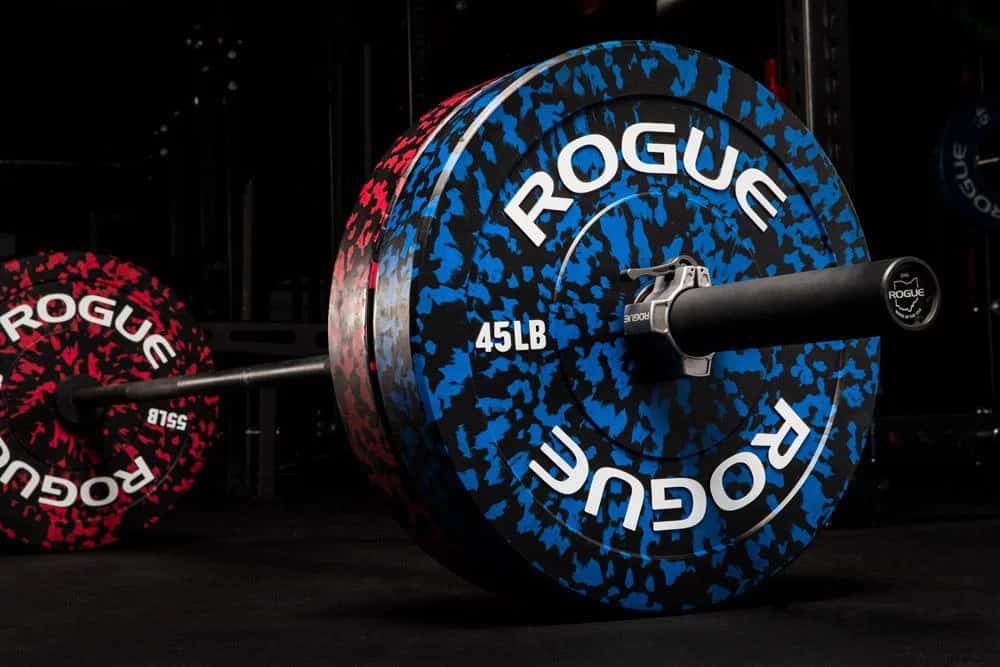
But, they still abide by the standardized color code. Red = 55 lbs, Blue = 45 lbs, etc.
These are high quality bumper plates with a durometer rating of 90 with a steel insert.
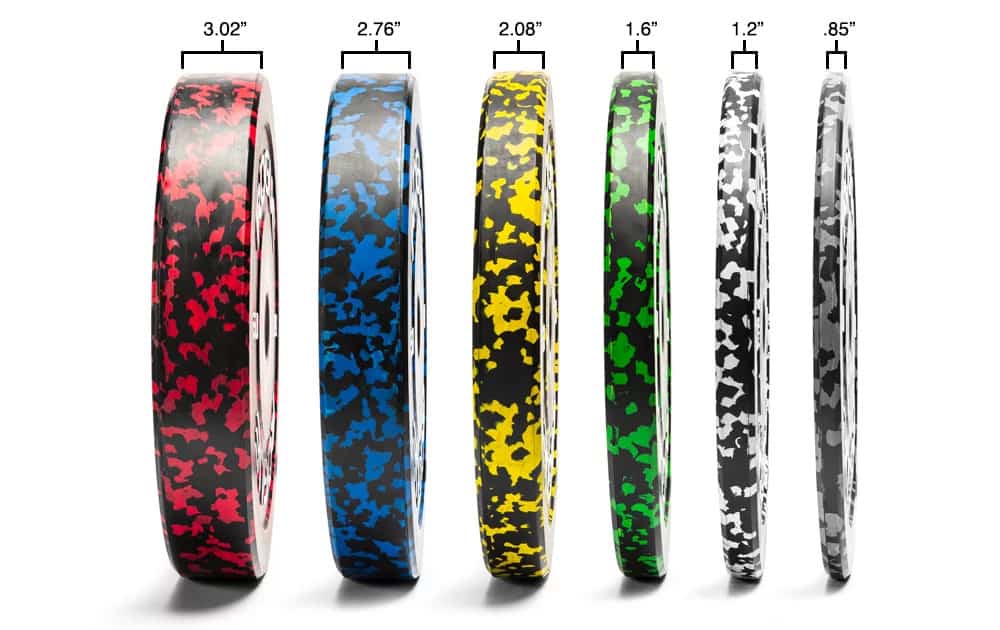
Ultimate Durability – Bumper Plates Made From Urethane
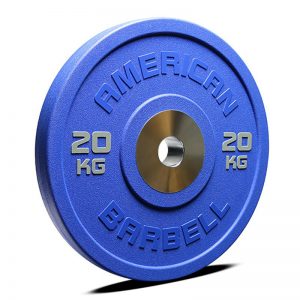
Before we move on, let’s discuss one more bumper plate option – bumper plates made from urethane.
American Barbell offers a complete line of Kg sized bumper plates made from urethane.
Urethane is a polymer substance that has both the elastic and weight properties we need for bumper plates.
And, it’s far more durable than rubber.
When you use bumper plates you should only use them in conjunction with a lifting platform, or other suitable surface.
Rubber plates on bare concrete are prone to scuffing and abrasion.
Urethane ups the ante with incredible durability – and great looks as well – with bright, vibrant colors.
As a bonus, urethane bumper plates tend to be thinner than their rubber counterparts – but still wider than iron plates.
The downside? These are expensive plates.
But if you want the good looks, and durability that will last literally a lifetime, these might be the right plates for you.
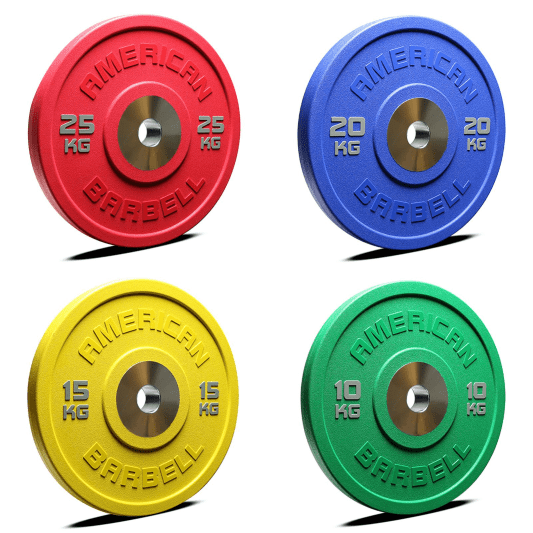
Competition Bumper Plates
Competition plates are manufactured to a very high quality standard.
For example, these Rogue KG Competition Plates are guaranteed to be within +/- 15 grams of the marked weight.
These plates are also IWF approved for use in competition (you can see the IWF logo below.)
As such, they are more expensive than training plates – but they are very nice.
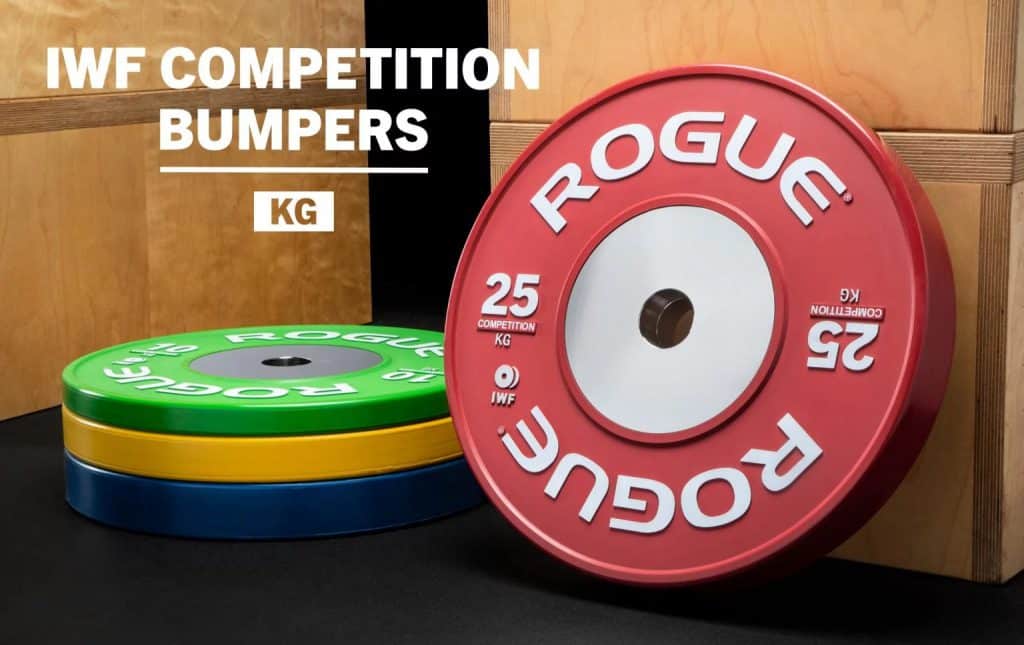
What Are Technique Plates?
Technique Plates are a way to load a barbell with a minimal load for a novice lifter, but still maintain the proper starting bar height off the floor.
The “first pull” for the clean or snatch starts from the floor. If you have a beginner who is still learning technique you do not want the bar to be loaded too heavy. Technique plates allow you to get the bar at the right height in the starting position but aren’t too heavy.
Technique plates can also be useful for rehabbing athletes. This allows them to practice their starting movements from the proper height off the ground before transitioning to actual bumpers.
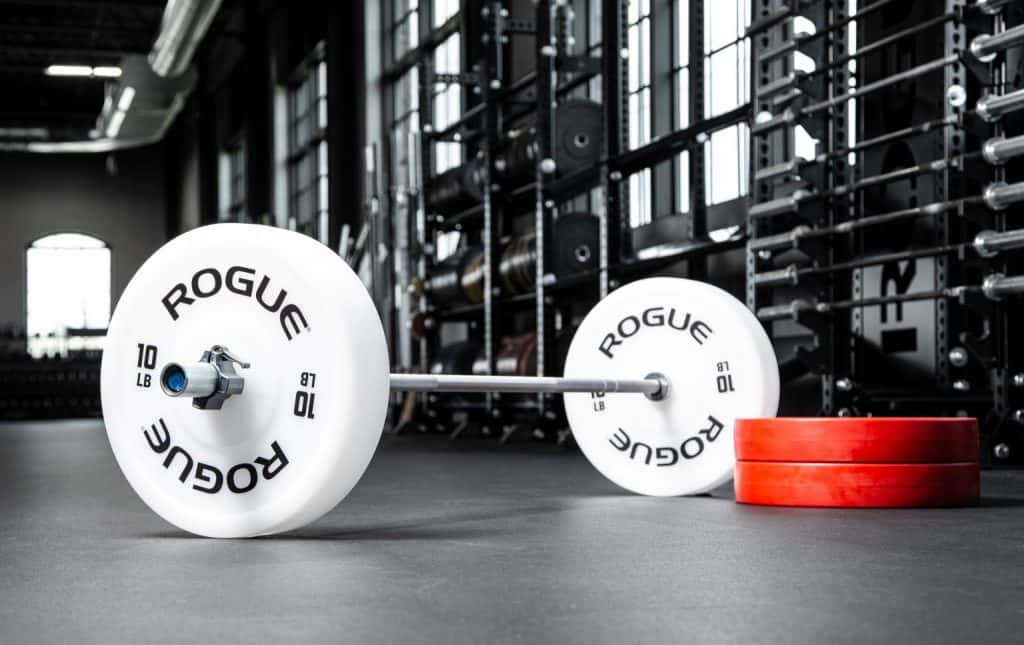
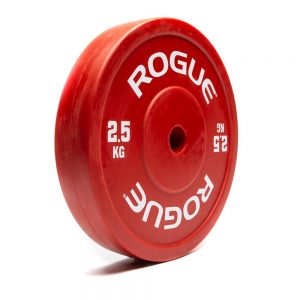
And new for 2019, Rogue Fitness now offers technique plates. These are constructed from a high-density polyethylene (HDPE) plastic. And perhaps most importantly these light-weight plates have the same 450mm (17.7 inch) outside diameter as standard full-size Olympic bumper plates.
These are sold in pairs and are available in 2.5 KG, 5 KG, 5 LB, or 10 LB sizes.
You may also be interested in a technique barbell which is a lighter weight version of an Olympic barbell, but still has the proper dimensions to accept bumper plates. For example, the Rogue C-70 bar is a 35 lb version of the Ohio bar. As an added bonus, it’s also shorter, so you can fit more people in a training space. The C-70 bar was used at the CrossFit Games 2019 for this reason.
Do I Need Change Plates?
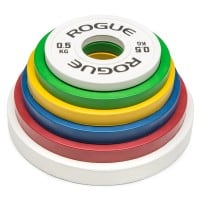 If you are buying bumpers, you’ll need Change Plates too. Change Plate is the terminology used for the smaller plates used with bumpers – sizes from about .5 KG up to about 5 KG. Key difference? These are much, much smaller in diameter than the big plates.
If you are buying bumpers, you’ll need Change Plates too. Change Plate is the terminology used for the smaller plates used with bumpers – sizes from about .5 KG up to about 5 KG. Key difference? These are much, much smaller in diameter than the big plates.
Because they are so much smaller in diameter, they aren’t ever going to contact the floor – so they can be iron/steel or steel with a thin rubber coating. While the coating or lack thereof is not a concern – you will want plates that fit on the bar snugly – so they don’t rattle around excessively when you are dropping the barbell.
Some form of change plate is essential, because as we’ll discuss below, you’ll make the best progression in lifting by adding small amounts of weight at a time.
If you want pure rubber change plates – made just like a mini-bumper plate – check out Fringe Sport’s Ouroboros .5 Lb and 1 Lb change plates (Buy on Amazon).
Available in .5 lb and 1 lb sizes, you can throw these in your gym bag, and have the ability to microload anywhere.
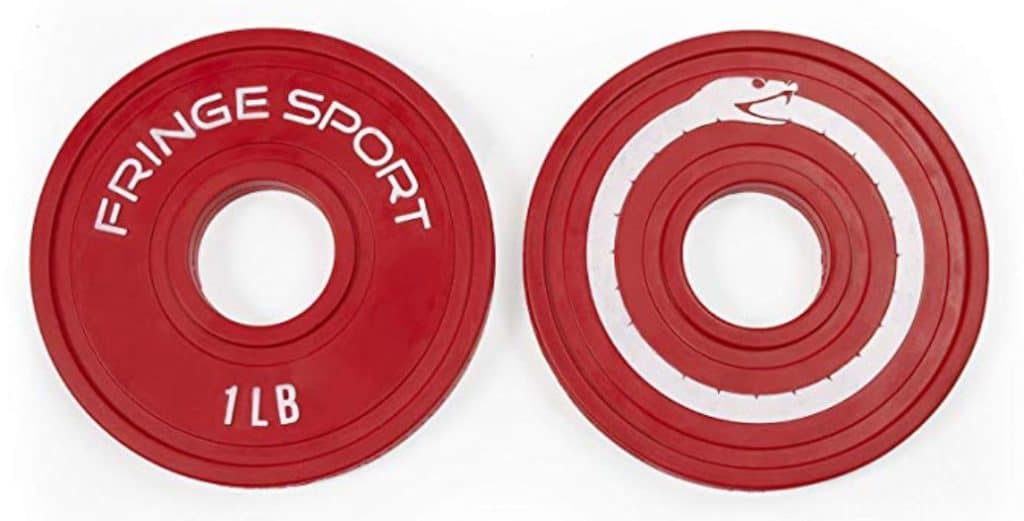
What are Fractional Plates?
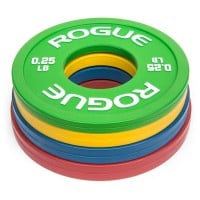 Fractional plates really let you micro-load. What’s that? That’s keeping progress moving forward by adding very small amounts of weight, like adding 1 pound (or less) at a time. Fractional plates are even smaller than change plates and usually run from 1Lb down to .25Lb, or 1 Kg to .125 Kg.
Fractional plates really let you micro-load. What’s that? That’s keeping progress moving forward by adding very small amounts of weight, like adding 1 pound (or less) at a time. Fractional plates are even smaller than change plates and usually run from 1Lb down to .25Lb, or 1 Kg to .125 Kg.
Again, since they are so tiny they aren’t ever going to contact the floor – so whether they are iron, or rubber coated is irrelevant.
If you are just getting started in your lifting career, you can probably live without the fractional plates, at least for a year or two. Intermediate and advanced lifters will benefit from having access to a set of fractional plates.
A typical beginner mistake is to take jumps in weight that are simply too big. You shouldn’t be adding 25 lbs. or even 10 lbs. to the bar every time you lift. For the major compound movements, such as the bench press, squat, and deadlift, shoot for a 5 lb increase.
Further, don’t discount the long-term progression you can make with micro-loading. For a beginner, adding 5 lbs. of weight per workout is excellent – but that’s not going to last forever. You will reach a point where adding 2.5 lbs., 1 lb, or even less is a necessary increment. This is also how you continue to milk gains out of a lifting cycle. Adding 3 lbs. over 3 weeks is better than adding 0 lbs.
Having the capability to add increments of less than 1Lb or 1KG are especially essential to lifts like the over head press. That lift reaches a point quickly where you’ll be glad to be adding 1 lb at a time…
So there you go. Some great choices. And there’s even more models and options on the Rogue website. We recommend you check out the detailed customer reviews as well – this is great intel to have before you make that purchase.
Rogue Dumbbell Bumpers – A Versatile Option
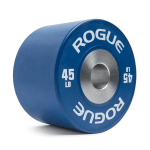
Rogue even offers dumbbell bumpers. What the heck are these? They’re dumbbell sized bumper plates, for use with a loadable dumbbell. Because they are smaller in size, they aren’t meant to be dropped from overhead. Now, why would you want these wide dumbbell plates? Aren’t they too much size for a dumbbell? Maybe, and maybe not. And there’s other versatile uses for these, for instance:
- Need a minimum of noise? Bumpers eliminate the majority of clanking weight plates
- Minimum diameter – Got a low ceiling in your garage gym? These are a compact option you can use to put weight on a regular bar, with less overhead clearance required. All the dumbbell bumpers are 230mm in diameter (about 9 inches). They’ll work anywhere you need a compact weight.
- You could also use them like “change plates” – so, that’s a versatile option – load them on the dumbbell or on a regular barbell.
I fled the commercial gyms, and headed to the garage, over 12 years ago, and have never looked back. The crowds, the fees, the drive time, the inadequate equipment – it was no longer worth the expense.
Sure, it makes sense to have a membership and the associated fees – if you use the amenities, like the group classes, or if you need a trainer, or if you simply don’t have the space or equipment to host your own gym.
But the reality is that true effective strength and endurance training can be accomplished for far less cost, and inconvenience right in your garage or home gym. In this series of articles, we’re highlighting the essential gear. Modify these plans as you see fit, after all – it’s your garage – and ultimately the garage gym is about freedom.
In Summary – Garage Gyms and Olympic Weight Plates
In summary, serious strength training requires an Olympic weightlifting barbell – and the weight plates to go with it. Consider investing in a high-quality barbell and bumper or steel plates – depending on whether or not you plan to get serious about power training and the Olympic lifts. They’ll last you a lifetime and pay countless dividends.
We hope this information has been useful, and in the next article, we’ll discuss further all the proper equipment needed for a well-equipped garage gym. If you have any questions, please let us know.
You may want to review our guide to garage gym power racks and guide to the best weightlifting barbells as well.
Photo & Image Credits
- All Rogue Fitness product imagery is property of Rogue Fitness, and provided by Rogue Fitness.
- Some product imagery is property of American Barbell. We are an American Barbell affiliate – if you order products after clicking our links, we receive a small commission at no additional cost to you.
- This website is not affiliated or associated with CrossFit, Inc. CrossFit is a registered trademark of CrossFit, Inc.
- Some product imagery on this page is property of FringeSport and provided by FringeSport. We are a FringeSport affiliate, and so if you purchase equipment after clicking links in this article we receive monetary compensation.
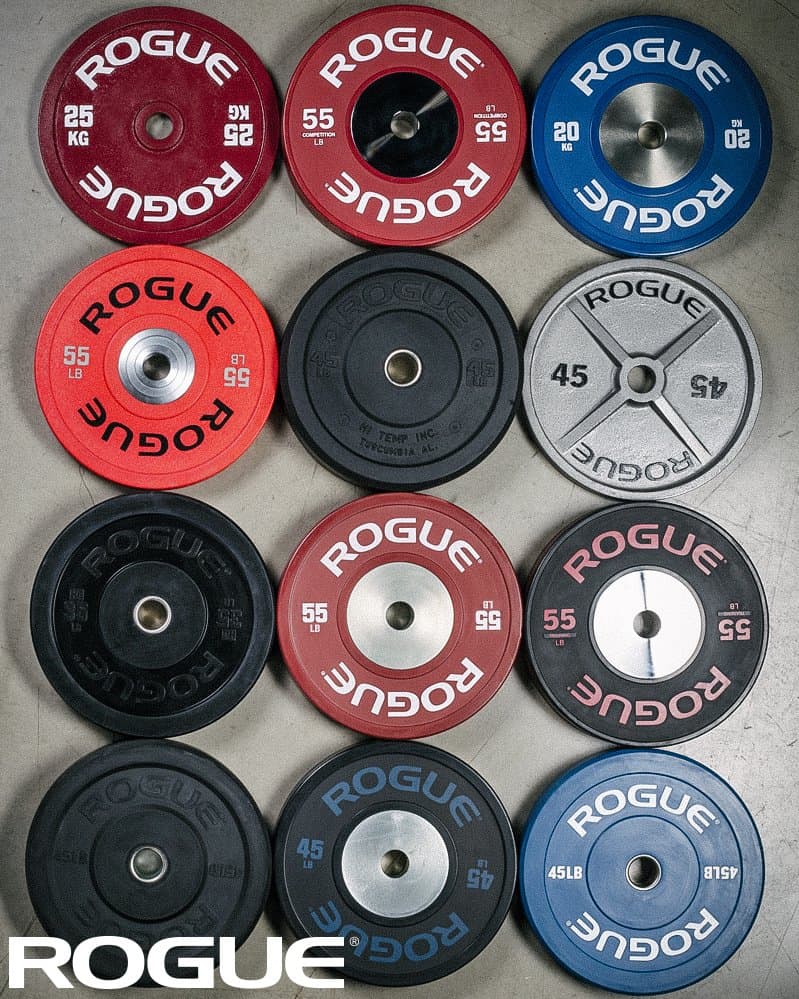
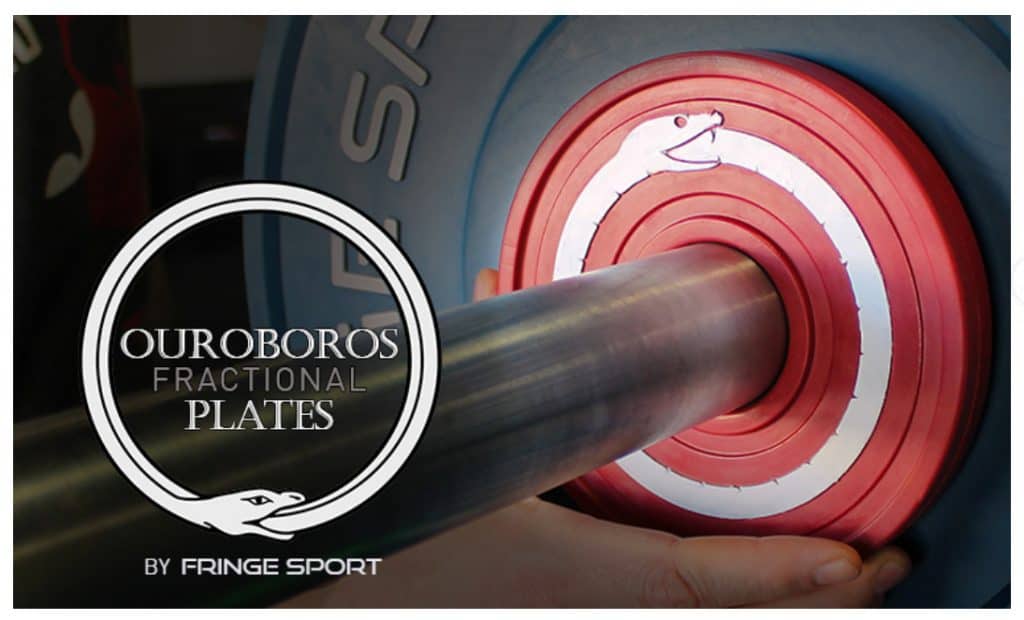

Tim is the founder of FitAtMidlife.com – an avid gym rat for 30+ years, he’s a reviewer of many, many shoes – and founder of the Speed Bag Gathering – the world’s only gathering of speed bag punching enthusiasts. See more gym reviews at Tim’s YouTube channel.

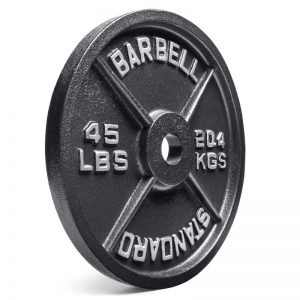
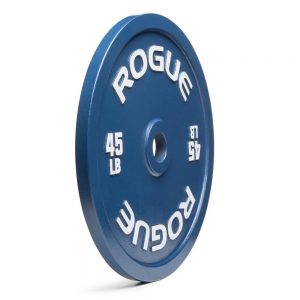
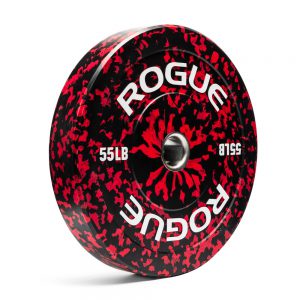
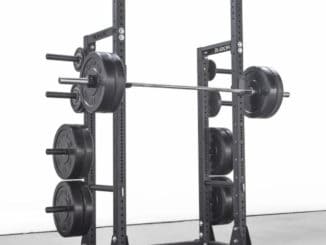
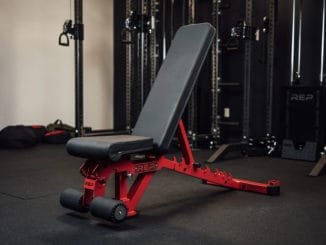

Grab weights are more user friendly
Than any weights shown.with grab weights you can use the plate alone to do any exercise that you do whith a dumbell